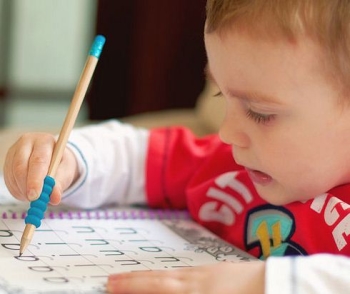Fine Motor Skills: The Key to a Lifetime of Educational Success
By: Megan Eldridge, OTR/L; Handwriting Development Expert

People often bring children to me to get help for “handwriting” but they really need much more.
When a child struggles with handwriting, it is usually a symptom of an underlying problem. The first task is to evaluate the child individually to find the cause.
Poor handwriting may be the symptom of a larger problem
There are two major areas that need evaluation when children are struggling with handwriting:
- Fine-motor skills
- Visual-motor skills
These two components are vital to the long-term success of children in school and are critical for more than just handwriting.
Start with a 14-point fine-motor skills evaluation
Each one of the 14-different fine motor skills plays a critical role when it comes to learning and handwriting.
For example, if a child presses too hard or too lightly when writing, we know that the arches of their hands are not fully developed.
If a child flexes their wrist when writing, they do not have good wrist stability. Children with this challenge are actually losing 30%-40% of their muscle strength and coordination, which greatly affects their ability to write.
A child’s hand must be well coordinated before it can skillfully manipulate a “tool” such as a pencil. In other words, you can’t put the cart before the horse.
Fine-motor skills lay the foundation for an efficient pencil grip and ultimately, legible handwriting.
Linda Lamme, a Professor at the University of Florida’s College of Education, outlined six specific prerequisites for handwriting. The top two listed are small muscle development and eye-hand coordination.
Visual-motor skills are equally as important when it comes to handwriting and learning
Vision is more than 20/20 eyesight. “Sight” refers to a person’s ability to see clearly at near and far distances.
“Vision” is the ability to interpret and understand information that comes through the eyes.
According to Mary McMains, O.D., M.Ed., F.C.O.V.D., “The visual system is a significant part of how we process information and a key factor in how we learn”.
“Eighty percent of what you perceive, comprehend and remember depends on the efficiency of the visual system.”
Screening for visual tracking and convergence insufficiencies of the eyes (using both eyes to move, align, fixate and focus as a team) are two simple ways you can identify red flags.
Once identified, significant fine-motor skill problems can be further assessed with an in-depth evaluation by a specialist.
Fine-motor and visual-motor skills are vital when it comes to academic success
If these skills are not developed early it is easy to see how difficult and energy consuming it is for a child to perform well in a classroom setting.
Children who have motor skill challenges have to put forth an enormous amount of energy to accomplish the same tasks that take other children a fraction of the concentration and effort.
The great news is that there is help for children who are struggling.
The first step is to get an evaluation by an occupational therapist that specializes specifically in fine-motor skill development related to handwriting. The best option is to find an expert that is knowledgeable in both fine-motor and visual-motor skill development in children.
They can recommend a treatment plan to help develop the necessary skills to build a child’s confidence and help them achieve a lifetime of academic success.
Featured Author: Megan Eldridge
Megan is a licensed Occupational Therapist (OTR/L), has a Masters Degree in Occupational Therapy (MOT) with a pediatric specialty and is a specialist in fine motor skill development for children 4 – 12, focusing on improving handwriting as the foundation for educational success.
Megan has been a featured speaker on childhood fine motor development and handwriting improvement for educational groups, State conferences as well as teaching other Occupational Therapists her methods.
To find out more about handwriting development, visit my blog at http://www.meganeldridge.com
PediaStaff is Hiring!
All JobsPediaStaff hires pediatric and school-based professionals nationwide for contract assignments of 2 to 12 months. We also help clinics, hospitals, schools, and home health agencies to find and hire these professionals directly. We work with Speech-Language Pathologists, Occupational and Physical Therapists, School Psychologists, and others in pediatric therapy and education.
